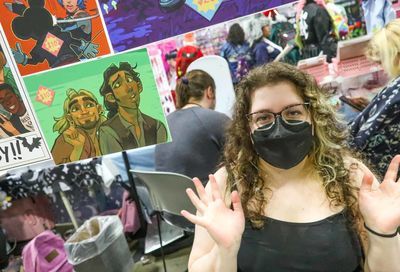Advocates stress education, outreach on Black HIV/AIDS Awareness Day
Whitman-Walker Health, Us Helping Us emphasize peer eduction, dismantling oppressive systems as crucial to curbing infections among the Black community.

“Black Americans have the highest rate of HIV diagnosis. They are almost 8.5 times more likely to be diagnosed with HIV than their Caucasian counterparts,” says Ramatoulaye Keita, Whitman-Walker Health’s Director of Community Health, referring to statistics from the Centers for Disease Control and Prevention on the incidence of HIV.
Despite overall progress in reducing HIV transmission in the United States, HIV continues to disproportionately affect some groups more than others. One of the populations specifically impacted is Black individuals, who account for a higher proportion of new HIV infections compared to other racial and ethnic groups.
In 2019, for example, Black people accounted for 41% of new HIV diagnoses in the United States, despite accounting for only 13% of the total population. The incidence is even higher among Black gay and bisexual men, who accounted for 26% of all new HIV diagnoses overall, and 37% of new diagnoses among all men who have sex with men.
A recent CDC report published last week found that 52% of Black adults diagnoses with HIV resided in areas of the country with higher Social Vulnerability Index scores – which are often residentially-segregated communities with higher incidences of poverty that are also affected by social factors such as lack of access to a vehicle, crowded housing, or difficulty accessing services.
“Black Americans in this country deal with structural racism and inequality that impacts every aspect of our lives, from economic stability to education to food, security and health care,” notes Keita. “It’s important to understand that Black people are disproportionally affected for reasons that are not at the individual level, but at a systemic level and an institutional level. So it is up to health care workers to dismantle the current health care system that we have that oppresses our Black people.”
But part of fighting the HIV epidemic also relies heavily on education, so that people can take control of their health care, employ prevention methods to better protect against transmission, pursue regular testing to know their HIV status, and, if they test positive, pursue treatment options that make HIV a more manageable health condition.
Each year, on Feb. 7, the Strategic Leadership Council marks National Black HIV/AIDS Awareness Day. The day is intended to increase HIV education, testing, and treatment among Black Americans, as well as commemorate those lost to the virus.
“On National Black HIV/AIDS Awareness Day, we honor those in the struggle who combated the virus. The nurses who cared for patients dying of AIDS. The Black queer men and transgender women who battled the virus that devastated their community. The blood-related and chosen families who lost someone due to the virus. The advocates who stood up in the ‘80s and the ones still marching today to change the narrative that Black people are still disproportionately affected by HIV,” Roderick Sheppard, a PrEP specialist at Whitman-Walker Health, said in a statement.
To mark the day, some local health advocacy and service organizations are stepping up to host educational or outreach events. For example, Whitman-Walker Health is hosting a community discussion, at 6 p.m. on Instagram Live, featuring personal stories and testimonials from panelists who are living with HIV.
“We’ll be talking to panelists who are living with HIV to address stigma and destigmatize HIV in the Black community, to encourage folks to get tested to increase their knowledge and education about the virus and the disease, to know that treatment is out there, and that Whitman-Walker is an affirming health care space ready to address health concerns and support folks, address social determinants of health and break down those barriers that frequently cause Black folk to have difficulty in accessing care,” notes Keita.
“Health literacy and health education are an important tool to addressing any health care needs that a person has in a system that’s predominantly built for other racial ethnicities that are not black people,” she adds. “That’s why it’s extremely important to highlight days like Black HIV/AIDS Awareness Day, and to put folks on platforms who are directly going through the experience, so Black folks can see themselves in health care, see folks navigating health care, and living full lives while living with HIV.
“In those spaces, education isn’t coming from health care providers, it’s coming from community members, folks who look like you,” Keita says. “We know that receiving information from peers is one of the most effective intervention tools when it comes to engaging folks in achieving optimal health and engaging in their health care. … It’s important for folks to see that affirming health care spaces exist, while affirming and validating Black people’s experience in the health care system, the mistrust that’s there, but also showing ways we’ve taken tangible steps to really put Black health care first.”

Another health advocacy group that is putting itself out there for Black HIV/AIDS Awareness Day is Us Helping Us, People Into Living, Inc., which is holding rapid HIV, Hepatitis C, and syphilis testing on the campus of Howard University from 11 a.m. to 3 p.m. While Us Helping Us already collaborates with Howard’s Student Health Center to provide HIV testing on Wednesdays and Fridays by appointment, appointments are not required for Monday’s mass testing and education event on the lower level of Burr Gymnasium.
“In the past, Black HIV/AIDS Awareness Day was a major event on campus, where it was like an open fair. We would have a table and private dividers and partitions where we can do the testing, provide people with results, and provide them with information about PrEP,” says Antoine Pollard, the principal PrEP coordinator at Us Helping Us. “We’ll be doing something similar this year, where students will come in groups with their friends and we educate them. We’ve also planned to have educational things going on while people are waiting to get tested, like a trivia game that informs them about HIV and the ways you can contract it, how HIV today compares to when it was first discovered.”
If a student wishes to be connected with PrEP, Us Helping Us will either refer them to the student health center to get connected, or can offer up its own health care services at its Georgia Avenue location to ensure the student can is connected to the appropriate resources, Pollard says. Us Helping Us will also make referrals for those students who test positive for HIV or other STIs and are in need of treatment, either from the health center or from Us Helping Us.
Pollard notes that if health advocates are truly seeking to end the HIV epidemic by 2030 — the year that federal officials have targeted for curbing the spread of HIV through various medical interventions, regular testing, and treatment as prevention – they must also target and engage communities where infection rates remain high.
“If you look at the data as far as HIV [infections], the African-American community is definitely up there in terms of numbers,” he adds. “So we want to focus on that group of individuals to say, ‘Hey, if you don’t get tested regularly, let’s just take this one day to come out and get tested.’
“With National Black HIV/AIDS Awareness Day being within Black History Month, I think testing events like the one we have planned just allow us to be able to connect on a different level, to say, ‘If there’s one day out of the year you’re going to get tested for, it’s today,'” says Pollard. “And if you are living with HIV, we can say, ‘OK, let’s get you into treatment,’ so you can continue to live your life and be just as healthy as somebody living with diabetes or high blood pressure, because HIV is now a more manageable disease and they have the medication in place. So you can live a regular life.”
Support Metro Weekly’s Journalism
These are challenging times for news organizations. And yet it’s crucial we stay active and provide vital resources and information to both our local readers and the world. So won’t you please take a moment and consider supporting Metro Weekly with a membership? For as little as $5 a month, you can help ensure Metro Weekly magazine and MetroWeekly.com remain free, viable resources as we provide the best, most diverse, culturally-resonant LGBTQ coverage in both the D.C. region and around the world. Memberships come with exclusive perks and discounts, your own personal digital delivery of each week’s magazine (and an archive), access to our Member's Lounge when it launches this fall, and exclusive members-only items like Metro Weekly Membership Mugs and Tote Bags! Check out all our membership levels here and please join us today!





















You must be logged in to post a comment.